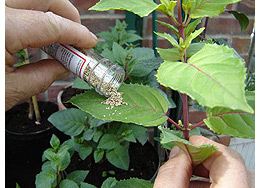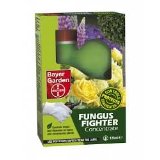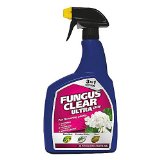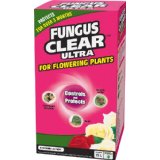How Natural is Your Garden?
Gardens straddle the gap between the man-made and the wild
Your house is obviously man-made and except in rare instances nature doesn't intrude. Your garden on the other hand is actually a piece of nature that you are trying to mould to your own desires. Mainly your desires are not natural (for the garden that is, I seek not to cast aspersions!) and nature will try to reclaim the garden for her own.
To this end she will throw all kinds of plants (that we regard as weeds) and animals (that we regard as pests) into the fray, add to that a whole host of bacteria, fungi and viruses (that we regard as diseases) and we sometimes have what can seem to be an uphill struggle.
All is not lost however as it is more beneficial to have modest level of pests and diseases in your garden than to have none at all as they will support a range of beneficial insects and other creatures that will keep them in check without any intervention from you.
Clear all of the pests out of the way with over zealous chemical spraying and you clear away the "cavalry" too, so when the next lot of pests arrive - and they surely will - they will enjoy their meals completely unmolested.
Some feel that chemical sprays are the one and only answer, but you will need to keep applying them again and again for the reasons described above. You may prefer to be completely organic or use a combination.
My own preference is to be as organic as possible, but to use a limited number of chemicals sparingly as what I think of as a "smart bomb" for particularly artificial situations such as when the greenfly or whitefly get too numerous in the greenhouse, or when my favourite Victoria plum tree gets far more than its fair share of black fly that begin to cause the leaves to curl and whole small twigs to lose their leaves and die.

Insect
hotel / house
A sheltered insect house to help a range of beneficial
insects to over-winter in your garden. If they are over-wintering there,
they are in an ideal position come the spring and summer to wake up and
help to combat any pests you may have. Amongst others, good for ladybirds,
lacewings and solitary wasps which will help keep your unwanted garden visitors
down. Place in a sheltered place outdoors.

Biological
Pest Control - Organic living pest control for a variety of
problems, red spider mite, whitefly, fungus gnats (sciarid fly), thrips, mealy bug,
vine weevils and more.
These are parasites or predators that will specifically infect the pest they are brought in to control without harming any other living things and without the use of chemicals. A small population of pests needs to be maintained so that the control agent doesn't die out.

Chemical insecticides - If your plants get a heavy infestation, then I think it's acceptable to use a chemical insecticide as a "smart missile" just on that particular plant. I resort to this when the aphids build up under cover on my favourite plum tree, or other plant/s. Don't overdo it and spray too often and don't spray the whole garden "just-in-case", buy a small 1L or thereabouts sprayer so you don't get carried away.
Not pest specific.
Avoiding Problems in the First Place
![]() Choose healthy plants that like growing in your garden.
Plants that struggle to cope with your particular weather, soil
etc. conditions will always be more susceptible to pests and
diseases.
Choose healthy plants that like growing in your garden.
Plants that struggle to cope with your particular weather, soil
etc. conditions will always be more susceptible to pests and
diseases.
![]() Place plants in their preferred conditions. An excellent
way of causing death-by-aphid for instance is to put a sun-loving
(read that as sun-requiring) plant in the shade. They
just won't be able to grow strongly enough or produce their
own chemical retaliation (a sort of plant immune system) in
enough quantities to fight back.
Place plants in their preferred conditions. An excellent
way of causing death-by-aphid for instance is to put a sun-loving
(read that as sun-requiring) plant in the shade. They
just won't be able to grow strongly enough or produce their
own chemical retaliation (a sort of plant immune system) in
enough quantities to fight back.
![]() Use pest and disease resistant varieties wherever possible.
For instance species roses and floribundas are have much better
resistance than hybrid teas. This is particularly important
for fruit and vegetables.
Use pest and disease resistant varieties wherever possible.
For instance species roses and floribundas are have much better
resistance than hybrid teas. This is particularly important
for fruit and vegetables.
![]() Make sure all plants get the best possible start in your
garden and don't receive a check in growth when they are
planted.
Make sure all plants get the best possible start in your
garden and don't receive a check in growth when they are
planted.
![]() Keep your plants growing strongly so they shrug off pest
and disease attacks on their own. Clear them of weeds, remove
dead growth, give them compost and feed for instance.
Keep your plants growing strongly so they shrug off pest
and disease attacks on their own. Clear them of weeds, remove
dead growth, give them compost and feed for instance.
![]() Grow a wide variety of different plant types and mix
them together. Pests and diseases love monocultures,
also if anything does get a hold, it has less chance of spreading
to nearby similar plants.
Grow a wide variety of different plant types and mix
them together. Pests and diseases love monocultures,
also if anything does get a hold, it has less chance of spreading
to nearby similar plants.
![]() Encourage beneficial pest predators to help control
any potential problems.
Encourage beneficial pest predators to help control
any potential problems.
![]() Know your plants. There used to be something mentioned
every now and then about how plants responded if you talk to
them. Now while this is certainly complete nonsense in itself,
what does happen is that building familiarity with your plants
means that you spot early on when one is starting to look a
bit ill.
Know your plants. There used to be something mentioned
every now and then about how plants responded if you talk to
them. Now while this is certainly complete nonsense in itself,
what does happen is that building familiarity with your plants
means that you spot early on when one is starting to look a
bit ill.
How natural is your garden?
Something I've been thinking about for a while, particularly when I sprayed some terribly effective chemical on the aphids that were attacking the Philadelphus and the flowering cherry Prunus Amanagawa in the front garden. If I hadn't you see, they'd have been over-run - a state they were rapidly advancing to. The cherry wouldn't produce many flowers next year and the Philadelphus would have lost many of this years beautifully scented and shaped, elegantly simple, single, paper-white flowers (it's one of my favourite plants). I have these pangs of conscience that I ought to try to be more organic and "natural" than I am, then I came across this quote:
There are no green thumbs
or black thumbs. There are only gardeners and non-gardeners.
Gardeners are the ones who ruin after ruin get on with the
high defiance of nature herself, creating, in the very face
of her chaos and tornado, the bower of roses and the pride
of irises. It sounds very well to garden a 'natural way'.
You may see the natural way in any desert, any swamp, any
leech-filled laurel hell. Defiance, on the other hand, is
what makes gardeners.
- Henry Mitchell
Ok, not an argument for organic or not, but it's the principle of the "natural way" that I want to pick up on. Gardens are not really very natural places at all for plants. True they might look natural and they are made with "natural" ingredients, except that in reality they aren't. I'd like to make it clear that I'm not trying to be anti-organic. I just get a miffed with the holier-than-thou approach sometimes encountered by the knit-your-own-muesli fanatics. If someone has titchy organic lettuces with lots of slug damage I'm about as impressed as if they wear sack-cloth and ashes because they've given all their clothes to Oxfam - heart's in the right place, but they've missed the point somewhere along the way.
Garden plants aren't really natural. Some are of course, but very few in your garden are as nature intended - including geographically where nature intended. Let's say you have a Philadelphus and Amanagawa like me and decide that to be truly "natural", you need to let pests and predators build up to a sustainable natural level. By the time it had happened the shrub and the tree would be dead - why? because they are not a part of the natural ecosystem where my garden is. The aphids are, so are the ants that farm them (cute, but it really bugs me when I wipe the aphids off and later, I see an ant carrying an aphid back to the "pasture") and so are all of the weeds that grow there.
The reason that the aphids like them so much is that they (unnaturally) pump huge quantities of delicious sugars, amino acids and other goodies to the flower buds and growing tips. They also (unnaturally) don't have very good defences against insect attack (can't afford it after pumping so many goodies to the flowers), most plants have some kind of chemical/s to put insects off, tannin for instance and all of those nasties that make poisonous plants poisonous. Therefore they are part of a "balance" where the part they would play is by being dead.


 Fungicides,
concentrated or ready mixed and ready to use.
Fungicides,
concentrated or ready mixed and ready to use. Lets take a different example. Wild carrots are a common hedgerow plant where I live. Now wild carrots get attacked by carrot flies, carrot flies smell a wild carrot from miles away, (well maybe not miles, but much better than you or I could manage) home in and lay their eggs around soil level. The eggs hatch and the larvae feed on the root. Wild carrots are common because they can deal with this by not being too smelly and making life as difficult as they can for the carrot fly and larvae once they've arrived. In other words carrot and carrot fly are balanced and both survive.
Then along I come with my cultivated carrot seed and sow them. Up they come and I weed them (unnaturally) I may also keep an eye out for carrot fly (unnaturally) if I'm organic and despite my efforts with barriers, the flies lay their eggs, then I can't do anything much. If I'm not organic, I may apply a chemical and the plants survive. Either way there's no balance, the organic route the plants perish or suffer, produce little seed and get wiped out next year or the year after. The chemical way is obviously not balanced as without me the plants don't live to tell the tale. The carrots I grow are optimized for my purposes of eating productive flavoursome carrots, not for the survival of the carrot plants.
So what's the answer? Of course we should be organic where possible and not use chemicals too freely. I see them as a "smart bomb" to target particularly bad infestations that only occur on particular plants at particular times of the year, and even then not always. I have a "Stella" cherry tree for instance that got the smart bomb treatment last year as it was overrun with aphids and their black ant bouncers, this year - no sign of them at all.
The first thing I do with many pests is remove them by hand, rubbing aphids off is a bit messy, but my fingers are easily wiped off on the lawn. I'm not really quite as militant as I may appear, the chemicals only come out as a last resort. Blood, fish and bone fertiliser is the only slow release fertiliser I use. Firstly because it's organic, and secondly because of the ingredients and the ratio of N:P:K (nitrogen, phosphorous and potassium) being 6:6:6 I take great delight in calling it "the Fertiliser of Beelzebub".
Remember if you really want to garden the totally natural way, your garden will look just like the nearest piece of neglected land to your house. If we lived our lives totally naturally, then many of us would be as dead as a garden plant in the waste land - in my own case it would have been from the cerebral malaria I contracted in Africa, my "natural" role in that balance was to be compost.
Copyright 2000 - present. All Rights Reserved | Privacy Policy Statement
